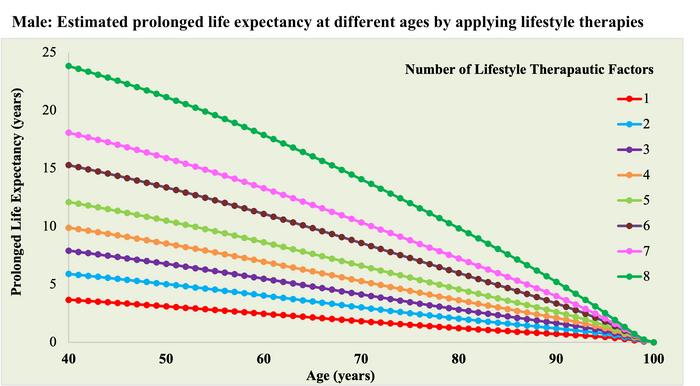
Click to Enlarge: The estimated impact of adopting different numbers of healthy lifestyle factors on additional years of life expectancy among men as compared to men with none of these habits. While adopting more healthy lifestyle factors at a younger age is associated with the greatest gains in life expectancy, adopting even a few of these factors or adopting them at an older age can still bring significant gains. Source: American Society For Nutrition
BOSTON — Adopting eight healthy lifestyle habits by middle age can help substantially lengthen life, according to a new study of veterans.
The new study involved more than 700,000 U.S. veterans and was presented at the recent American Society for Nutrition conference held July 22-25 in Boston.
The eight habits are:
- being physically active,
- being free from opioid addiction,
- not smoking,
- managing stress,
- having a good diet,
- not regularly binge drinking,
- practicing good sleep hygiene and
- having positive social relationships.
What difference does that make? According to the results, men who have all eight habits at age 40 were predicted to live an average of 24 years longer than men with none of these habits.
For women, meanwhile, incorporating all eight healthy lifestyle factors in middle age was associated with a predicted 21 additional years of life compared to women with none of these habits.
“We were really surprised by just how much could be gained with the adoption of one, two, three or all eight lifestyle factors,” said Xuan-Mai T. Nguyen, a VA health science specialist and rising fourth-year medical student at Carle Illinois College of Medicine. “Our research findings suggest that adopting a healthy lifestyle is important for both public health and personal wellness. The earlier, the better, but even if you only make a small change in your 40s, 50s or 60s, it still is beneficial.”
The study pointed out that chronic diseases are associated with more than 80% of all healthcare costs and are the main cause of morbidity and mortality in the United States. “Lifestyle medicine has been proposed as a potential way to address the root causes of chronic disease and their associated healthcare costs,” the authors wrote.
Their prospective cohort study involved 719,147 participants aged 40-99 years enrolled in the Million Veteran Program (MVP) between 2011-2019. The study team calculated age- and sex-specific mortality rates, as well as the hazard ratio (HR) for mortality. The study outcome was defined as all-cause mortality and estimated reductions in life expectancy.
“Based on 1.13 million person-years of follow-up with 33,375 deaths, we observed a mortality rate per 1,000 person-years of 72.6, 46.3, 36.3, 29.8, 25.2, 20.8, 15.7, 12.3 and 7.4 among veterans who adopted 0, 1, 2, 3, 4, 5, 6, 7 and 8 lifestyle factors, respectively,” the authors wrote.
Biggest Impact
The big picture suggested that low physical activity, opioid use and smoking had the biggest impact on lifespan, according to the study, with those factors associated with about a 30-45% higher risk of death during the study period. It added that stress, binge-drinking, poor diet and poor sleep hygiene were each associated with around a 20% increase in the risk of death, and a lack of positive social relationships was associated with a 5% increased risk of death.
Specifically, multiadjusted HR for mortality was:
- 0.95 (95%CI: 0.93-0.98) for those with positive social relationships,
- 0.82 (0.80-0.84) for those with good sleep hygiene,
- 0.81 (0.79-0.83) for nonbinge drinkers,
- 0.79 (0.77-0.80) for those with good diet,
- 0.78 (0.77-0.80) for those with minimal stress,
- 0.71 (0.69-0.73) for nonsmokers,
- 0.62 (0.59-0.66) for those with no opioid-use disorder, and
- 0.54 (0.53-0.56) for physically active veterans, compared with their counterparts.
“Compared to those with no adopted lifestyle factors, veterans with a combination of 8 individual therapeutic lifestyle factors had a 13% reduction in all-cause mortality,” the researchers pointed out. “Men and women who adopted eight therapeutic lifestyle factors could gain 23.7 or 22.6 years of life expectancy, respectively, at age 40 years compared to those with no adopted lifestyle factors.”
The authors concluded that therapeutic lifestyle factors were independently associated with a significantly lower risk of premature mortality, and the combination of these factors was associated with a multiplicative lower mortality risk.
“Lifestyle medicine is aimed at treating the underlying causes of chronic diseases rather than their symptoms,” Nguyen said. “It provides a potential avenue for altering the course of ever-increasing healthcare costs resulting from prescription medicine and surgical procedures.”
While the estimated gain in life expectancy from adopting the eight healthy lifestyle factors grew slightly smaller with age, it remained significant. “It is never too late to adopt a healthy lifestyle,” Nguyen said.
- Nguyen X-MT, Yanping L, Wang DD, Whitbourne SB, et. al. Eight Modifiable Lifestyle Factors Associated With Increased Life Expectancy Among 719,147 U.S. Veterans. Presented at the American Society for Nutrition annual conference, Boston, Massachusetts, July 22–25.

